 Libri di Alexander Kluge su Unilibro.it) Libri di Alexander Kluge su Unilibro.it)
|
|
2024 |
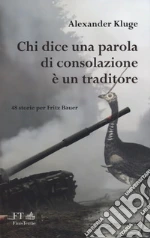 Title :
Chi dice una parola di consolazione è un traditore. 48 storie per Fritz Bauer
Title :
Chi dice una parola di consolazione è un traditore. 48 storie per Fritz BauerAuthor: Kluge Alexander Publisher: FT - FinisTerrae Il tema del Terzo Reich attraversa tutta l'opera Alexander Kluge. All'interno di questo confronto, lo sterminio degli ebrei costituisce un centro imprescindibile. La difficoltà di comprendere la Shoah con gli strumenti dell'arte risiede nel fatto che la forma narrativa classica in questo caso non funziona. Bisogna però continuare a raccontare: del fallimento delle élite, della velocità vertiginosa del male che si impone attraverso le autorità, di quanto sia raro potersi salvare. Chi dice una parola di consolazione è un traditore è un libro che circumnaviga il tema della Shoah, tante piccole storie di destini difficili, noti e sconosciuti. 48 frammenti (della lunghezza di una o due pagine al massimo) che raccontano intersezioni anche minime con quelle forme di organizzazione che annientano l'essere umano. 48 piccole tessere di un gigantesco mosaico, impossibile da completare. Questo libro ci mostra che se la Shoah sfugge alla forma compiuta, nel frammento invece riesce a emergere con la forza di un vissuto del presente. «Il processo Auschwitz» disse Bauer in un'intervista «ha per obiettivo di mostrare a noi tedeschi, ma anche al mondo intero, che la nuova democrazia ha la volontà di vigilare sulla dignità di ogni essere umano». Prefazione di Riccardo Calimani. € 18,00
Scontato: € 17,10
|
|
|
2022 |
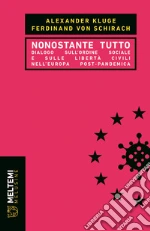 Title :
Nonostante tutto. Dialogo sull'ordine sociale e sulle libertà civili nell'Europa post-pandemica
Title :
Nonostante tutto. Dialogo sull'ordine sociale e sulle libertà civili nell'Europa post-pandemicaAuthor: Kluge Alexander; Schirach Ferdinand von Publisher: Meltemi In Nonostante tutto, Alexander Kluge e Ferdinand von Schirach si interrogano sulle implicazioni della pandemia da Covid-19 nei confronti dell'ordine sociale e delle libertà civili. Mentre il Coronavirus dava il via a una svolta epocale, gli autori si sono chiesti se la chiusura della società che ne è derivata abbia potuto innescare e giustificare anche una sospensione dei nostri diritti fondamentali. Nessuno avrebbe immaginato di vivere lo stato di emergenza in cui ci troviamo. Alcuni hanno pensato che sia finalmente giunto il momento dell'esecutivo, ma Kluge e von Schirach non sono d'accordo: viviamo in democrazia, abbiamo la separazione dei poteri e le decisioni spettano al Parlamento. Questo aspetto non può essere modificato. La nostra democrazia non sembra pertanto essere a rischio, ma la situazione potrebbe ribaltarsi, giacché le erosioni - come ricordano gli autori - procedono lente e per sottrazione, fino al capovolgimento improvviso. € 8,00
Scontato: € 7,60
|
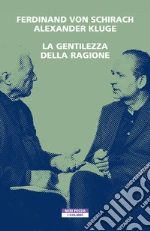 Title :
La gentilezza della ragione
Title :
La gentilezza della ragioneAuthor: Schirach Ferdinand von; Kluge Alexander Publisher: Neri Pozza Se un'intelligenza extraterrestre si avvicinasse alla Terra, vedrebbe di lontano quel puntino celeste che è il nostro pianeta. Ma il suo sguardo si soffermerebbe anche su minuscoli segnali luminosi, una sorta di presenza spirituale coerente: la traccia lasciata dai grandi pensatori di ogni epoca. Si aprono così, con quest'immagine visionaria, le cinque conversazioni che compongono 'La gentilezza della ragione'. Alexander Kluge e Ferdinand von Schirach, intellettuali, scrittori ma anche giuristi, si incontrano, dialogano, si completano, si contrappongono, come in quell'agorà dove Socrate cercava discepoli ma anche contraddittori. Proprio come nella piazza ateniese, in queste pagine Kluge e von Schirach discorrono di grandi temi morali partendo dallo spunto di quelli che possono riduttivamente definirsi casi giudiziari, con l'acume analitico degli uomini di diritto, ma anche con lo «sguardo nel cuore umano», come lo chiamava Schiller, dei letterati. A cominciare dal caso di Socrate, della sua rinuncia all'autodifesa e della conseguente condanna a morte. A seguire con Voltaire e la sua pubblica battaglia per riabilitare, in maniera postuma, l'innocenza di Jean Calas, un uomo giustiziato in modo atroce. E con Heinrich von Kleist e il suo racconto del Trovatello per indagare la malvagità e, in ultima istanza, la solitudine estrema dell'essere umano. Tre figure fondamentali per il pensiero occidentale, accomunate, secondo gli autori, da una razionalità 'gentile', che mai rinuncia al mito e alla trascendenza. Come una Wunderkammer rinascimentale, questo libro è una stanza delle me € 17,00
Scontato: € 16,15
|
|
2019 |
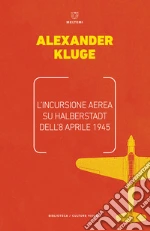 Title :
L'incursione aerea su Halbertstadt dell'8 aprile 1945
Title :
L'incursione aerea su Halbertstadt dell'8 aprile 1945Author: Kluge Alexander Publisher: Meltemi Alexander Kluge aveva undici anni quando ebbe luogo il bombardamento di Halberstadt, l'8 aprile 1945. Il suo non è un libro di testimonianza, bensì una ricostruzione ironica, distaccata e analitica di quella distruzione. Nella descrizione del disastro Kluge ripesca quel resto di razionalità e fiducia che ancora può rendere comprensibili le circostanze della catastrofe, rompendo così l'anatema del silenzio e mostrando possibili future vie d'uscita. Pubblicato per la prima volta nel 1977 e poi nel 2008 in questa forma accresciuta, 'L'incursione aerea su Halberstadt dell'8 aprile 1945' ci consegna un tassello fondamentale per scoprire la poliedricità del grande regista e uno sguardo illuminante sul possibile significato degli orrori della guerra. € 14,00
Scontato: € 13,30
|
|
|
1918 |
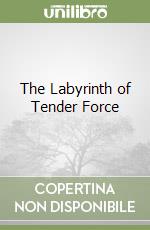 Title :
The Labyrinth of Tender Force
Title :
The Labyrinth of Tender ForceAuthor: Kluge Alexander, Hoban Wieland (TRN) Publisher: Seagull Books € 40,20
|
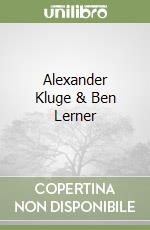 Title :
Alexander Kluge & Ben Lerner
Title :
Alexander Kluge & Ben LernerAuthor: Kluge Alexander, Lerner Ben Publisher: Spector Books € 32,30
|
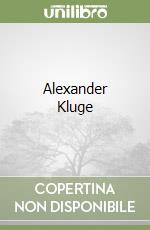 Title :
Alexander Kluge
Title :
Alexander KlugeAuthor: Kluge Alexander, Kluge Alexander (EDT), Bremer Fabian (EDT), Wenzel Jan (EDT), Fricke Anna (EDT) Publisher: Spector Books € 29,00
|
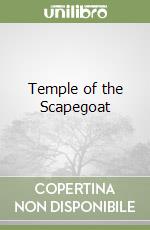 Title :
Temple of the Scapegoat
Title :
Temple of the ScapegoatAuthor: Kluge Alexander, Cole Isabel Fargo (TRN), Stonecipher Donna (TRN) Publisher: New Directions € 17,60
|
||
|
1917 |
 Title :
Drilling Through Hard Boards
Title :
Drilling Through Hard BoardsAuthor: Kluge Alexander, Jirgl Reinhard (CON), Hoban Wieland (TRN) Publisher: Seagull Books € 26,80
|
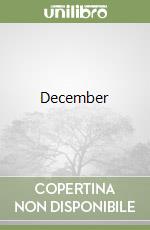 Title :
December
Title :
DecemberAuthor: Kluge Alexander, Richter Gerhard (PHT), Chalmers Martin (TRN) Publisher: Seagull Books € 22,60
|
|
1916 |
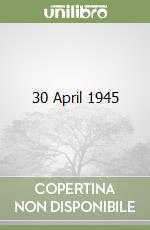 Title :
30 April 1945
Title :
30 April 1945Author: Kluge Alexander, Hoban Wieland (TRN), Combrink Thomas (CON), Jirgl Reinhard (CON) Publisher: Seagull Books € 22,30
|
 Title :
Dispatches from Moments of Calm
Title :
Dispatches from Moments of CalmAuthor: Kluge Alexander, Richter Gerhard, Mcbride Nathaniel (TRN) Publisher: Seagull Books € 22,30
|
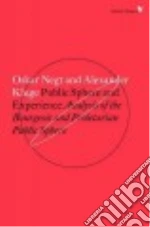 Title :
Public Sphere and Experience
Title :
Public Sphere and ExperienceAuthor: Negt Oskar, Kluge Alexander, Hansen Miriam (FRW), Labanyi Peter (TRN), Owen Jamie (TRN) Publisher: Verso Books € 26,30
|
|
2016 |
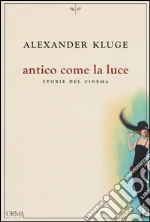 Title :
Antico come la luce. Storie del cinema
Title :
Antico come la luce. Storie del cinemaAuthor: Kluge Alexander Publisher: L'orma Il cinema come una forma di esperienza del mondo antica quanto la luce del sole. Questa la dichiarazione di fede e di amore di uno dei maggiori cineasti, narratori e teorici tedeschi dei nostri tempi. Un proliferare di aneddoti e apologhi fulminanti ed emblematici, carichi di una forza critica che si fa visione. Racconti e riflessioni in bilico tra realtà e finzione che giungono a comporre un'unica grande epica cinematografica. Dall'epopea picaresca dei pionieri ottocenteschi fino ai dietro le quinte del cinema contemporaneo, passando per il ruolo, inquietante e cruciale, giocato dall'uso della pellicola nella Prima guerra mondiale e nel nazismo e per la stagione di rottura delle nouvelles vagues europee, Kluge narra un'avventura bruciante che è stata anche una rivoluzione dello sguardo e del pensiero. Il ritorno di un autore inclassificabile capace di mettere a nudo con la sapienza del miniaturista i cortocircuiti della storia e la logica interna all'arte nata per far risplendere i sogni. € 18,00
Scontato: € 17,10
|
|
|
1915 |
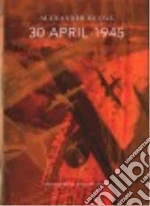 Title :
30 April 1945
Title :
30 April 1945Author: Kluge Alexander, Hoban Wieland (TRN), Jirgl Reinhard (CON), Galbraith Iain (TRN) Publisher: Seagull Books € 25,90
|
|
|
1914 |
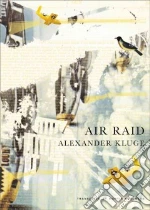 Title :
The Air Raid on Halberstadt on 8 April 1945
Title :
The Air Raid on Halberstadt on 8 April 1945Author: Kluge Alexander, Chalmers Martin (TRN) Publisher: Seagull Books On April 8, 1945, several American bomber squadrons were informed that their German targets were temporarily unavailable due to cloud cover. As it was too late to turn back, the assembled ordnance of more than two hundred bombers was diverted to nearby Halberstadt. A middle-sized cathedral town of no particular industrial or strategic importance, Halberstadt was almost totally destroyed, and a then-thirteen-year-old Alexander Kluge watched his town burn to the ground. Translated by Martin Chalmers, Kluge’s Air Raid is a touchstone event in German literature of the post-war era. Incorporating photographs, diagrams, and drawings, Kluge captures the overwhelming rapidity and totality of the organized destruction of his town from numerous perspectives, bringing to life both the strategy from above and the futility of the response on the ground. Originally published in German in 1977, this exquisite report, fragmentary and unfinished, is one of Kluge’s most personal works and one of the best examples of his literary technique. Now available for the first time in English, Air Raid appears with additional new stories by the author and features an appreciation of the work by W.G. Sebald. “More than a few of Kluge’s many books are essential, brilliant achievements. None are without great interest.”—Susan Sontag € 18,70
|
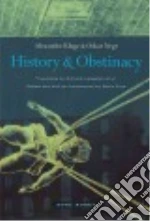 Title :
History and Obstinacy
Title :
History and ObstinacyAuthor: Kluge Alexander, Negt Oskar, Fore Devin (EDT), Langston Richard (TRN), Shahan Cyrus (TRN) Publisher: Zone Books If Marx's opus Capital provided the foundational account of theforces of production in all of their objective, machine formats, what happens when the concepts ofpolitical economy are applied not to dead labor, but to its living counterpart, the human subject?The result is Alexander Kluge and Oskar Negt's History and Obstinacy, agroundbreaking archaeology of the labor power that has been cultivated in the human body over thelast two thousand years. Supplementing classical political economy with the insights of fieldsranging from psychoanalysis and phenomenology to evolutionary anthropology and systems theory,History and Obstinacy reaches down into the deepest strata of unconsciousthought, genetic memory, and cellular life to examine the complex ecology of expropriation andresistance. First published in German 1981, and never before translated intoEnglish, this epochal collaboration between Kluge and Negt has now been edited, expanded, andupdated by the authors in response to global developments of the last decade to create an entirelynew analysis of "the capitalism within us." € 35,70
|
|
1912 |
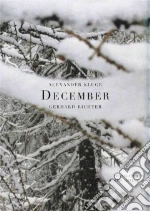 Title :
December
Title :
DecemberAuthor: Kluge Alexander, Richter Gerhard (PHT), Chalmers Martin (TRN) Publisher: Seagull Books In the historic tradition of calendar stories and calendar illustrations, author and film director Alexander Kluge and celebrated visual artist Gerhard Richter have composed December, a collection of thirty-nine stories and thirty-nine snow-swept photographs for the darkest month of the year. In stories drawn from modern history and the contemporary moment, from mythology, and even from meteorology, Kluge toys as readily with time and space as he does with his characters. In the narrative entry for December 1931, Adolf Hitler avoids a car crash by inches. In another, we relive Greek financial crises. There are stories where time accelerates, and others in which it seems to slow to the pace of falling snow. In Kluge's work, power seems only to erode and decay, never grow, and circumstances always seem to elude human control. When a German commander outside Moscow in December of 1941 remarks, “We don't need weapons to fight the Russians but a weapon to fight the weather,” the futility of his struggle is painfully present. Accompanied by the ghostly and wintry forest scenes captured in Gerhard Richter's photographs, these stories have an alarming density, one that gives way at unexpected moments to open vistas and narrative clarity. Within these pages, the lessons are perhaps not as comforting as in the old calendar stories, but the subversive moralities are always instructive and perfectly executed. Praise for Alexander Kluge “More than a few of Kluge's many books are essential, brilliant achievements. None are without great interest.”—Susan Sontag “Alexander Kluge, that most enlightened of writers.”—W.G. Sebald € 17,40
|
|
|
2007 |
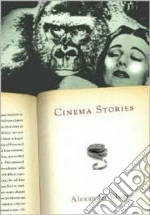 Title :
Cinema Stories
Title :
Cinema StoriesAuthor: Kluge Alexander Publisher: New Directions € 10,70
|
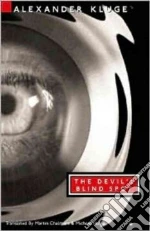 Title :
Devil's Blind Spot
Title :
Devil's Blind SpotAuthor: Kluge Alexander Publisher: New Directions € 13,40
|
|
1996 |
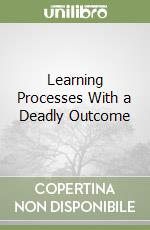 Title :
Learning Processes With a Deadly Outcome
Title :
Learning Processes With a Deadly OutcomeAuthor: Kluge Alexander, Pavsek Christopher (TRN), Pavsek Christopher Publisher: Duke Univ Pr Fiction writer, internationally known filmmaker, critical theorist, Alexander Kluge is perhaps postwar Germany’s most prolific and diverse intellectual. With this translation of Learning Processes with a Deadly Outcome, a novella first published in German in 1973, one of Kluge’s most important literary works becomes available to an English-speaking audience for the first time. Written in a quasi-documentary style, this fascinating hybrid work combines science fiction with modernist forms of montage and reportage to describe a future in which Earth has been almost totally destroyed following the catastrophic Black War. The planet’s remaining inhabitants have been driven underground or into space where the struggle to establish a new society rages on. Whether describing the scene in China where the devastated landscape is reconstructed according to old paintings, or in the galactic realm of the Starway where giant, turf-battling, corporate colonizing forces exploit the universe’s resources, Kluge tells his tale by inventing various forms of “evidence” that satirize the discourses of administrative bureaucracy, the law, military security, and the media. He gives us some of his most bizarre and hilarious characters in this peculiar world in which the remains of the past are mixed with the most advanced elements of the future. The cast includes highly specialized women workers who have adapted to the massive gravitational field of their heavy-metal planets, a commander with lethal foot-fungus, and ex-Nazi space pioneers who, in their lonely exile from the conflagrations on earth, spend their time carving enormous facsimiles of operatic sheet music in the forests of uninhabited planets. With parody, and humor, Kluge shows how the survivors of Armageddon attempt to learn the art of civilization, and, despite the disaster they have suffered, how they set out to reproduce at new sites a caricature of a classic and fascistic feudal capitalism. € 22,00
|
|